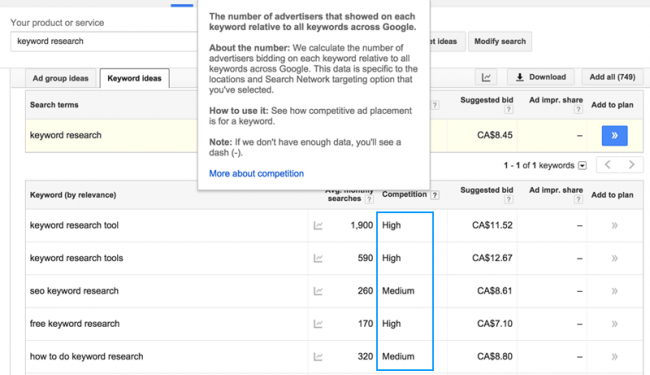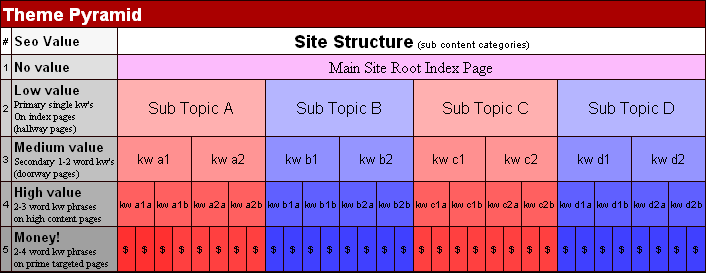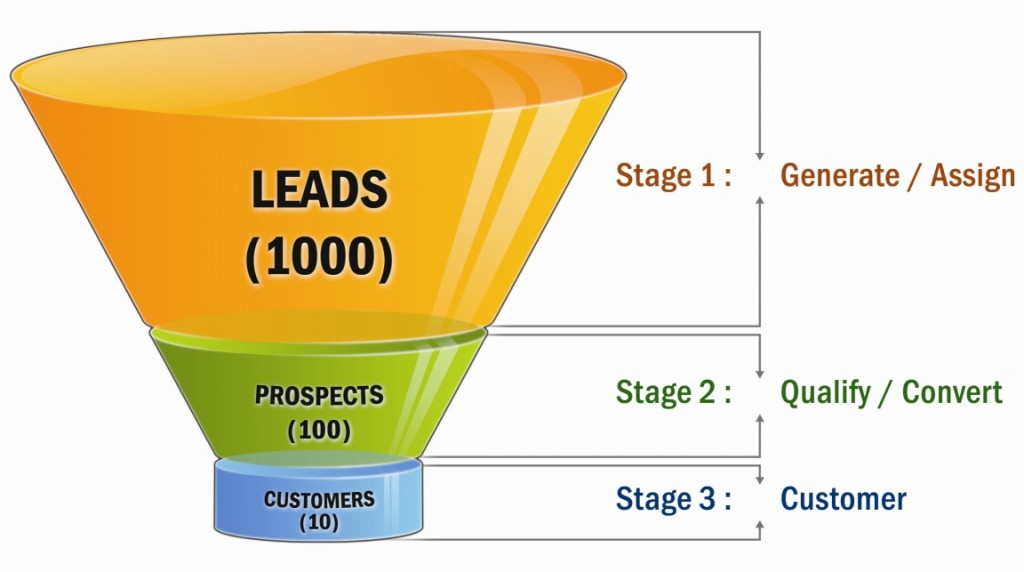Keyword Research Mistakes is unforgivable just because Keyword is the foundation of SEO. It can literally make or break an SEO campaign, yet it’s also one of areas that is most often misunderstood or taken for granted.
Whether you’re an entrepreneur looking to drive more organic traffic to your business, or an SEO looking to tighten up your skills, make sure you’re not making one of these 10 common keyword research mistakes that can sabotage your efforts to rank in Google.
1. Confusing Adwords Competition with SERP competition
Novice SEOs often confuse the “Competition” number shown in the Google Keyword Planner with “competition” in the SEO context.
The Competition (low, medium, high) metric shown in GKP actually doesn’t refer to the SEO competition you’ll face when trying to rank for a keyword – it refers to competition among Adwords bidders for that keyword.
It has nothing to do with SEO.
Although Competition in GKP is useless for figuring out whether you can rank for a keyword, it is actually a useful proxy for commercial intent – the higher the competition, the more likely the keyword is either:
1) a “buying” keyword
2) a keyword in a vertical with high visitor values.
If lots of advertisers are bidding on the keyword, then the keyword is more likely to be valuable.
2. Relying only on Google Keyword Planner
Google Keyword Planner is a great tool – you can punch in a seed keyword and get information on a keyword’s search volume, commercial value, and a list of up to 800 relevant keywords.
However, Google Keyword Planner doesn’t actually give you any information about a keyword’s competitiveness, which is crucial information if you’re running an SEO campaign.
Google Keyword Planner is also not very good at generating relevant keywords that aren’t closely related to your seed keyword.
For example, typing in the keyword “martial arts” in Google keyword planner gives you a list of keywords associated with martial arts, but it doesn’t mention a number of popular martial arts – let alone obscure martial arts niches, or top selling products.
With more digging you may other uncover other related keywords, but it’s also very easy to miss important keyword ideas.
The quickest way to get a comprehensive list of keyword’s covering a niche isn’t through Google keyword Planner, its through reverse engineering the keyword rankings for successful websites in your niche.
Google Keyword Planner should be just one weapon in your intelligence-gathering arsenal. If its is the only tool in your keyword research arsenal, you’re missing out on crucial information necessary to do accurate, efficient keyword research
3. Failing to emulate success
A lot of newbie SEOs in the niche site space struggle to find keywords and niche ideas. They’re often told to brainstorm for keywords and niche ideas by looking around them and writing down problems they see and personal passions.
This is a good idea in theory, but it’s easier said than done if you don’t already have experience building successful sites.
Keyword research and niche selection doesn’t have to be complicated. One easy way to get started is to simply emulate success. Instead of playing a guessing game, simply find successful websites and figure out how (and if) you can replicate their success.
Here’s a video I put together showing you how you can use product review sites to identify low competition Amazon niches.
Another great place to start looking for ideas is the website marketplace Flippa.com. Website owners list their websites along with traffic and revenue stats, giving you an opportunity to get access to valuable traffic and profitability data you wouldn’t get otherwise.
Here’s a great tutorial on using Flippa to find profitable niches by my friend Lewis Ogden.
You can take this one step further and once you find a website to emulate, use a tool like AuthorityMetrics to reverse engineer the keywords the website is ranking for.
Since AuthorityMetrics also pulls a difficulty score for each keyword alongside a detailed analysis of the top 10 search results, you can quickly sort the keywords for a successful website to identify the low hanging fruit.
4. Not grouping long tail keywords
Targeting long tail keywords is an SEO no-brainer.
If you’re working with an authoritative domain, then targeting long tail keywords often lets you rank with no additional link building.
If you’re working with a brand new domain with minimal authority, your best chance of gaining SEO traction comes from targeting long tail keywords.
If you have even some basic SEO knowledge, you already know you should be targeting long tail keywords. But you might not realize that you’re missing out another big opportunity by not grouping longtail keywords together.
When you target long tail keywords, make sure to group them together, with the most competitive/highest volume longtails as the subject of the content, then weave the longer tail keywords (lower volume, lower competition – usually phrases with 4+ words) throughout the article.
This gives you a piece of highly optimized content where you can gradually climb the rankings ladder from super longtail phrases to more moderately competitive long tail keywords. Eventually, your content can rank for an entire group of keywords as you build links
Grouping together keywords and organizing them as a whole is also how you should approach structuring your site from an SEO perspective.
You want to organize your keywords and site structure like a pyramid, with the most competitive short tails at the top (homepage+category pages), with the mid-tail, moderate competition keywords as your cornerstone content, and the long tail keywords (most of your blog posts + longtails within your cornerstone content) as the foundation.
Source: http://www.wordstream.com/blog/ws/08/03/09/long-tail-guide
5. Not truly understanding SERP competition
It’s important to have a reliable keyword difficulty metric to help you quickly identify a keyword’s relative competition level. This allows you to quickly sort through large keywords lists and identify low hanging fruit.
However, sometimes you have to look beyond difficulty scores (which usually reflects the top 10 results in aggregate) and dive deeper into analyzing the top 10 search results.
For really low competition keywords, I don’t spend too much time diving into the SERPs and doing deep analysis. Its low competition, so since I have some existing linkbuilding resources that I can easily tap into – I can just build a few links to it and see how it responds.
But when you’re targeting keywords where you need to invest into a sustained, long-term, and potentially expensive campaign to rank – you need a strong understanding of the competition within the SERP you’re targeting, because every SERP has a different “texture”.
A keyword can have moderate competition according to a ballpark difficulty score, but that can mean drastically different things, depending on the SERP texture.
You could be dealing with a SERP that looks like it has moderate competition because every result from 10 to 1 isn’t especially strong, or it could look like it has moderate competition because positions 10 through 5 have low competition, but positions 1 to 4 will be almost impossible to outrank.
Since positions 10 to 6 only get around 3.73% of the clicks for any query, failing to take into account the texture of the SERP can be devastating to your SEO strategy – especially if you’re investing heavily to rank for a competitive keyword. You may end up getting permanently stuck in position 5, with only minimal results to show for your efforts.
Developing the ability to look at a SERP and quickly analyze competition understand its “texture” is a crucial SEO skillset.
6. Not thinking about conversion rates and visitor values
Outside of the publishing business where traffic volume matters, SEO campaigns are designed to generate revenue by way of sales. This means you ultimately want to find the keywords in your niche where you can convert the searcher into a paying customer.
Pretend you have 2 keywords that have similar SERP competition. Pretend you only have enough resources to target 1 of them.
One keyword has 2000 local monthly searches, the other one only has 500. Which one should you target?
The answer is that it depends – we still need more data to make an informed decision. How well does the keyword convert? What is the value of each conversion?
If the 500 search volume keyword is “buy blue widgets” which has a $100 conversion value and converts at 10% and the 2000 search volume keyword is “interesting blue widget facts”, which also has a $100 conversion value but only converts at 1%, then you will want to target the first keyword, even though it has much lower search volume.
| Keyword | Search Volume | SERP CTR | Conversion Value | Conversion Rate | RankValue |
| buy blue widgets | 500 | 32.24% | $100 | 10% | $1,611.20 |
| interesting blue widget facts | 2000 | 32.24% | $100 | 1% | $644.80 |
Obviously its difficult to know a keyword’s conversion rate before you actually have data.
If you’re targeting lower-moderate competition keywords, you can take a shotgun approach where you do basic keyword research then refine your SEO campaign as you gain traction and gather data.
If you’re targeting more competitive keywords, sometimes its better to gather data with PPC before investing heavily into a long-term SEO campaign.
In either case, it’s important to understand whether a searcher has commercial intent, which leads us to our next mistake.
7. Not understanding commercial intent
Keywords can generally be divided into 3 buckets according to search intent: Informational, Navigational, and Commercial Investigation.
Keywords that are informational or navigational generally have low commercial intent, while commercial investigation (aka “buying” keywords) have high commercial intent.
Commercial investigation keywords are “buying” keywords – they’re the type of queries people type into Google when they’re looking to buy a product, or looking for a solution to an urgent problem they’d be willing to pay for.
Commercial investigation keywords show buying intent – e.g. “buy blue widgets”. It could be an intent to look up price (e.g. blue widget cost), where they can find a deal (cheap blue widgets, blue widget coupons) or an intent to find out where they can buy (e.g. where to buy blue widget), intent to research before purchasing (e.g. blue widget review, blue widget comparison) etc.
Some verticals also have commercial investigation keywords that are niche specific. In the health vertical, keywords that contain the word “treatment”, “cure”, or “remedy” are buying keywords, whereas those keywords may not even exist in finance – where the buying keywords may contain words like “quote”, or “instant” could indicate high commercial intent.
In all of these cases, the person entering the search query is doing “commercial investigation” before they buy a product, which means these keywords will likely have a high conversion rate.
Whatever niche you’re in, learn to understand which keywords are informational and which ones are commercial. This can help you prioritize your keyword targeting and maximize the ROI of your campaigns.
8. Not targeting informational keywords
While low competition “buying” keywords are going to be your sweet spot, that doesn’t mean you should neglect informational keywords when planning out your SEO strategy.
Not all informational keywords are created equal – some really are just random searches where the user is browsing for useless information, others indicate that the searcher could be a potential customer in your market.
Example:
Someone searching for “best juicing recipes” might not be looking to buy a juicer or a juicing info product, but they are certainly a potential customer if you’re in the business of selling juicing related products. They’re just not in “buying mode”.
However, if you can capture their information, you can push them into the top of a sales funnel that can end at the bottom with a certain % of searchers becoming paying customers.
Source: www.pureleverage.com
In addition to being the top of the funnel, informational keywords can have other less tangible benefits as well.
- If lots of people are searching for an informational keyword in your niche, it’s an indication that this topic is important to your audience.
- Having lots of relevant informational content makes your site look more like an authority to Google.
- People are more likely to link to/share informational content vs. commercial pages.
- If you’re in the publishing business, targeting informational keywords with low commercial intent can drive huge volumes of organic traffic.
Informational keywords and buying keywords both have value – but you need to be aware of the differences and adjust accordingly depending on your goals.
9. Not thinking enough about searcher intent when selecting keywords.
A lot of SEOs look at keyword research and the traffic associated with it as an arbitrage opportunity. Can I rank for this keyword, how much traffic can I get, and how much can I make from it?
While these are important questions to ask, its also important to ask yourself whether the page you’re creating really meets a user’s needs.
Are you targeting an e-commerce keyword with an informational page that doesn’t actually sell the product? Are you creating a page about career salaries that has a 500 word article, but no detailed salary data?
This creates a bad user experience that will cause users to bounce back to the SERPs – a very bad thing from both a business and an SEO perspective, which can lead to a penguin penalty.
Failing to consider searcher intent can also result in targeting a SERP that leans heavily towards specific types of sites e.g. e-commerce sites.
Without the on-site signals that indicate that you’re an e-commerce store, it’s going to be an uphill battle to rank and maintain rankings for e-commerce keywords where the top 10 results are dominated by online stores.
As Google gets better and better at understanding natural language and refining their algorithms to understand query intent (see Hummingbird), on-page SEO becomes more and more about providing searchers with exactly what they need.
If you can’t give the buyer what they’re looking for, sometimes its better to move onto another keyword where you can provide value.
10. Failing to understand the keyword landscape
Competition in a market is a good sign – it means there’s money to be made. Of course, competition can be bad if it makes it difficult to gain traction.
The difficulty of a market from an SEO perspective isn’t binary – a market can be both competitive and offer a lot of opportunity to rank for longtails and dominate sub-niches via organic search.
Or it can be competitive and offer very few ways for the average SEO to gain traction.
Different markets have different keyword landscapes.
| Is The Market Competitive? | Opportunity to rank? | Will SEO be profitable for my business? |
| Yes | Yes | Yes |
| Yes | No | No |
For example, a niche like health & nutrition is considered competitive. But there are so many people typing in different informational queries and so many new products and trends coming popping up, the result is a ton of longtail keywords and sub-niches where you can grab an SEO foothold.
You might not always gain traction with the highest volume, highest converting keywords (which will be ultra competitive) but you’ll be able to find sub-niches with long tail keywords with long term value.
On the other hand, a niche like insurance is also considered competitive – especially in the US. But there are far fewer longtails and far fewer varieties of new products that makeup profitable, low competition sub-niches. This makes it much, much harder to gain an SEO foothold.
Both markets are considered competitive from a macro point of view, but if we actually dive deeper and look at individual keywords within the context of the keyword landscape, we quickly realize that one competitive market offers a ton of opportunity for the average SEO, while the other doesn’t.
Taking Your Keyword Research To The Next Level
If you want to be a pro at KW research, you should strongly consider grabbing a good tool. I have personally used Nate’s to find great keywords that my competitors are ranking for, and without reservation recommend checking it out!




